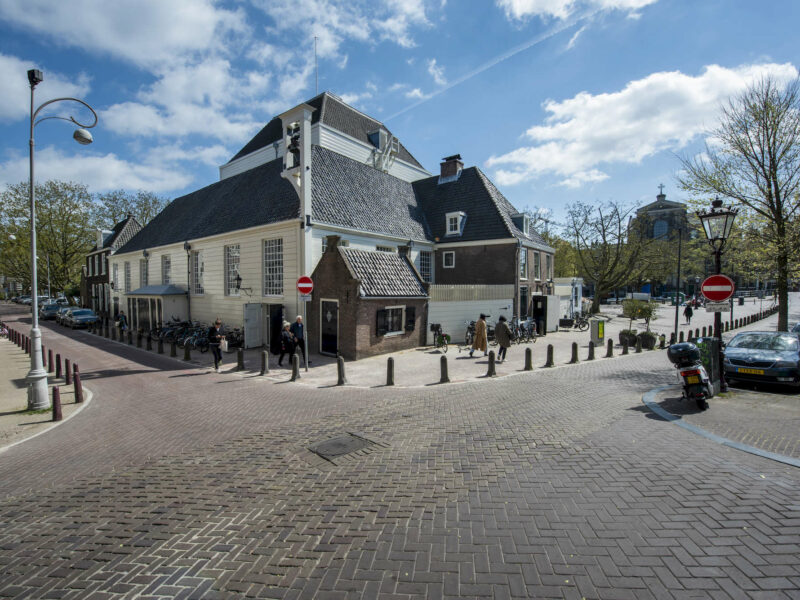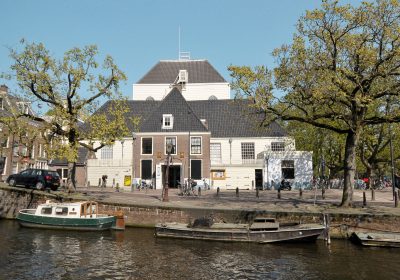Deze avond staat in het teken van de geschiedenis van de bouw in Nederlands-Indië met experts Arif Sarwo Wibowo and Robert-Jan de Kort
Guest-speakers: Arif Sarwo Wibowo and Robert-Jan de Kort
Time: 19h30-21h00 (drinks and meal from 18h30)
Language: English
Dear ICOMOS members and heritage friends,
Herewith we cordially invite you to attend ICOMOS’s next lecture evening, to be held in Amsterdam’s Amstelkerk on Wednesday 9 April.
This evening we will learn how construction practice in the Dutch East Indies evolved under colonial rule. Dutch building tradition and local practice gradually merged and created new typologies. To what extent were contemporary needs met and to what extent can they accommodate current demand? Arif Sarwo Wibowo, from ITB Bandung, will tell us about the emergence of the school building-typology in the beginning of the 20th century. Robert-Jan de Kort, a Rotterdam based architect, will explain about his fascination with the East Indies Gallery House.
Feel welcome to join and feel free to share this announcement.
We are looking forward receiving you on 9 April at the Amstelkerk in Amsterdam,
ICOMOS-NL’s Lecture Committee,
Ankie Petersen, Anna Louwerse, Daan Lavies, Emma Egberts. Jacomine Hendrikse, Jean-Paul Corten, Milou Derksen, Remco Vermeulen
Registration is mandatory through below mentioned link. You will receive no confirmation of your registration.
Costs for attending the lecture amount EURO 5,- (free for ICOMOS-NL members).
Costs for the meal amount EURO 15,- (drinks not included).
Payments can only be made by QR-code on the spot.
PROGRAMME – ON-SITE event in Amsterdam
18h30 Joint Meal
19h30 Opening and Introduction – Jean-Paul Corten
19h45 Educational Infrastructure in Colonial Bandung – Arif Sarwo Wibowo
20h30 Break
20h45 The Dutch Indies Gallery House – Robert-Jan de Kort
21h30 End
Educational Infrastructure and Architectural Heritage in Colonial Bandung
by Arif Sarwo Wibowo
Bandung was designated as a Gemeente in 1906 and later elevated to a Stadsgemeente in 1926, prompting significant physical development in the city. This growth was further accelerated in the 1920s following discussions about the possible relocation of the capital of the Dutch East Indies from Batavia to Bandung, which spurred even more rapid urban expansion.
The implementation of the Ethische Politiek in the early 20th century also contributed to the development of educational infrastructure in Bandung. This period marked the introduction of modern formal education for the indigenous population, leading to the establishment of various specialized institutions such as Meer Uitgebreid Lager Onderwijs (MULO), Hogere Burger School (HBS), and Kweekschool. Consequently, school buildings became an integral part of the city’s architectural diversity.
Many of these historical school buildings remain intact today, with most still serving their original function. Examining their current condition and evaluating their ability to support Indonesia’s contemporary education system offers a valuable subject for further study.
The Gallery House
by Robert-Jan de Kort
About four hundred years ago, the tropical climate in the former Dutch East Indies caused the Dutch to fundamentally change the way they built their homes. Architect Robert-Jan de Kort highlights the origins of the gallery house: the common housing type in the former colony. This type of house had similarities to traditional Javanese homes and was therefore well-suited to withstand the tropical heat and rain. Due to the characteristic layout with front, inner, and rear galleries, the houses had a notable openness that allowed for a specific way of living. Special attention is given to the fact that the origins of this housing type are rooted in centuries-old Indonesian building traditions. Finally, the question is raised about the relevance of the qualities of the gallery house for current housing challenges in both Indonesia and the Netherlands.
Arif Sarwo Wibowo (1977) is an Associate Professor at the School of Architecture, Planning, and Policy Development at Institut Teknologi Bandung (ITB), Indonesia. He earned his Bachelor’s and Master’s degrees from ITB in 1999 and 2002 respectively, and obtained his doctoral degree in Colonial Architecture from the Tokyo Institute of Technology in 2007.
Since then, he has been actively engaged in academia as a faculty member at ITB, contributing to the advancement of architectural education. His work includes efforts to establish international accreditation for higher education in architecture. From 2021 to 2022, he served as the Secretary General of the Indonesian Association of Schools of Architecture.
In addition to his academic contributions, his deep interest in historical architecture has led to active involvement in heritage conservation initiatives as a member of the Bandung Heritage Society.
Robert-Jan de Kort (1979) is an architect. He studied architecture at Delft University of Technology and ETH Zurich and has a hybrid practice of designing, writing, and teaching.
For over 15 years, he has been designing architectural projects, mainly transformations of protected buildings or new constructions in unique environments.
Reflection plays an important role in his professional practice. He writes stories that encourage readers to see things differently and evoke specific appreciation.
Robert-Jan publishes his articles on architecture on platforms such as Archined and Vers Beton. From 2016 to 2019, he was a member of the editorial board of the Dutch Architectural Yearbook. In 2013, he founded the international lecture platform TALKS about architecture. He has also been writing columns for De Architect since 2023.
Robert-Jan is actively involved in architectural education, including at the Rotterdam Academy of Architecture, where, with his ‘Studio Typisch Wonen,’ he focuses on housing typology.


